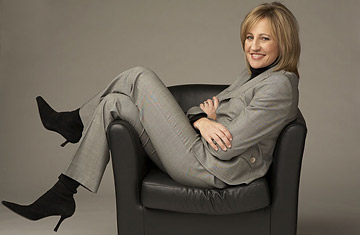
Dee Dee Myers thinks motherhood should count as diplomacy experience.
(2 of 3)
Myers:I hope we have this conversation as a public. I'd love to have this conversation with her, but I hope we also do as a country. I don't think gender is Hillary's only obstacle. And I don't think it's all men's fault. Sometimes, we are our own worst enemies. We don't take enough credit for our own accomplishments. I am endlessly fascinated that playing football is considered a training ground for leadership, but raising children isn't. Hey, it made me a better leader: you have to take a lot of people's needs into account; you have to look down the road. Trying to negotiate getting a couple of kids to watch the same TV show requires serious diplomacy. It's important that women claim that.
TIME:You were appointed the country's first female White House press secretary. Yet you were stiffed when it came to proper pay, authority and even the press secretary's rightful office. When you went to argue for a raise, [then chief of staff] Leon Panetta told you you didn't deserve what a male colleague of lower rank made because you weren't a man supporting a family. Would that have happened if a woman was your boss?
Myers:That's a good question. It would depend on the woman. Not every woman is perfect; we all hear the horror stories of female bosses. But at that moment in 1994, I just thought no one would say these things out loud. Yet [Panetta] did.
When I became White House press secretary, there were other limitations that were thrust upon me. Bill Clinton was under pressure to appoint women to visible positions. I was 31, I'd never worked in Washington. Was I ready for this large and visible job? Still he wanted the credit. So he gave me the job but diminished the job. I had a lower rank, lower pay. In Washington, you take away the symbols of status and you take away the status. I had more responsibility than authority. I tell that story because I think that's something that happens to women. Then you get blamed when everything doesn't go perfectly. I believe we need to share these stories.
TIME:Didn't experience, circumstance and age factor in? If you were, say, the Dee Dee Myers of 2007, would Panetta have said the same thing?
Myers:No. I mean, age was certainly part of it, being young and female and from California — it's the trifecta of how not to go [to Washington]. But there had never been a woman standing behind that podium. Fifteen years later, and hopefully five or six years the wiser, I hope that wouldn't happen. But similar things happen to women every day. Women have to know what they're getting into. They have to own their own credentials, to let people know what they've accomplished. What we bring to the table is really important.
TIME:Anyway, that's the wrong question, isn't it? To reach pay equity — not just for women, but for other traditionally overlooked groups — must pay be pegged solely to performance?
Myers:I think how pay gets determined is pretty broad — experience, how people look, what they bring to the job. But there's no question women are paid less. Women don't ask. A Carnegie Mellon study found that men were seven times more likely to negotiate a starting salary than women are. There are all kinds of reasons [for unequal pay]; there's residual discrimination. But also women don't go in there and tell the world what they're worth.
